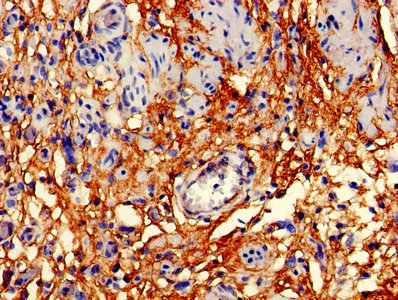CD59 Polyclonal Antibody
RD253030A
ApplicationsELISA, ImmunoHistoChemistry
Product group Antibodies
ReactivityHuman
TargetCD59
Overview
- SupplierReddot Biotech
- Product NameCD59 Polyclonal Antibody
- Delivery Days Customer5
- ApplicationsELISA, ImmunoHistoChemistry
- CertificationResearch Use Only
- ClonalityPolyclonal
- Concentration1.02 mg/ml
- ConjugateUnconjugated
- Gene ID966
- Target nameCD59
- Target descriptionCD59 molecule (CD59 blood group)
- Target synonyms16.3A5, 1F5, EJ16, EJ30, EL32, G344, HRF-20, HRF20, MAC-IP, MACIF, MEM43, MIC11, MIN1, MIN2, MIN3, MIRL, MSK21, p18-20, CD59 glycoprotein, 1F5 antigen, 20 kDa homologous restriction factor, CD59 antigen p18-20 (antigen identified by monoclonal antibodies 16.3A5, EJ16, EJ30, EL32 and G344), CD59 blood group antigen, CD59 molecule, complement regulatory protein, Ly-6-like protein, MEM43 antigen, T cell-activating protein, human leukocyte antigen MIC11, lymphocytic antigen CD59/MEM43, membrane attack complex (MAC) inhibition factor, membrane attack complex inhibition factor, membrane inhibitor of reactive lysis, protectin, surface anitgen recognized by monoclonal antibody 16.3A5
- HostRabbit
- IsotypeIgG
- Scientific DescriptionThis gene encodes a cell surface glycoprotein that regulates complement-mediated cell lysis, and it is involved in lymphocyte signal transduction. This protein is a potent inhibitor of the complement membrane attack complex, whereby it binds complement C8 and/or C9 during the assembly of this complex, thereby inhibiting the incorporation of multiple copies of C9 into the complex, which is necessary for osmolytic pore formation. This protein also plays a role in signal transduction pathways in the activation of T cells. Mutations in this gene cause CD59 deficiency, a disease resulting in hemolytic anemia and thrombosis, and which causes cerebral infarction.
- ReactivityHuman
- Storage Instruction-20°C
- UNSPSC12352203




